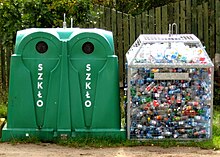|
Recycling is processing used materials (waste) into new products to prevent waste of potentially useful materials, reduce the consumption of fresh raw materials, reduce energy usage, reduce air pollution (from incineration) and water pollution (from landfilling) by reducing the need for "conventional" waste disposal, and lower greenhouse gas emissions as compared to virgin production. Recycling is a key component of modern waste reduction and is the third component of the "Reduce, Reuse, Recycle" waste hierarchy. Recyclable materials include many kinds of glass, paper, metal, plastic, textiles, and electronics. Although similar in effect, the composting or other reuse of biodegradable waste – such as food or garden waste – is not typically considered recycling. Materials to be recycled are either brought to a collection center or picked up from the curbside, then sorted, cleaned, and reprocessed into new materials bound for manufacturing. In a strict sense, recycling of a material would produce a fresh supply of the same materialâ€â€for example, used office paper would be converted into new office paper, or used foamed polystyrene into new polystyrene. However, this is often difficult or too expensive (compared with producing the same product from raw materials or other sources), so "recycling" of many products or materials involves their reuse in producing different materials (e.g., paperboard) instead. Another form of recycling is the salvage of certain materials from complex products, either due to their intrinsic value (e.g., lead from car batteries, or gold from computer components), or due to their hazardous nature (e.g., removal and reuse of mercury from various items). Critics dispute the net economic and environmental benefits of recycling over its costs, and suggest that proponents of recycling often make matters worse and suffer from confirmation bias. Specifically, critics argue that the costs and energy used in collection and transportation detract from (and outweigh) the costs and energy saved in the production process; also that the jobs produced by the recycling industry can be a poor trade for the jobs lost in logging, mining, and other industries associated with virgin production; and that materials such as paper pulp can only be recycled a few times before material degradation prevents further recycling. Proponents of recycling dispute each of these claims, and the validity of arguments from both sides has led to enduring controversy.
Recycling has been a common practice for most of human history, with recorded advocates as far back as Plato in 400 BC. During periods when resources were scarce, archaeological studies of ancient waste dumps show less household waste (such as ash, broken tools and pottery)â€â€implying more waste was being recycled in the absence of new material. In pre-industrial times, there is evidence of scrap bronze and other metals being collected in Europe and melted down for perpetual reuse. In Britain dust and ash from wood and coal fires was collected by ’dustmen’ and downcycled as a base material used in brick making. The main driver for these types of recycling was the economic advantage of obtaining recycled feedstock instead of acquiring virgin material, as well as a lack of public waste removal in ever more densely populated areas. In 1813, Benjamin Law developed the process of turning rags into ’shoddy’ and ’mungo’ wool in Batley, Yorkshire. This material combined recycled fibres with virgin wool. The West Yorkshire shoddy industry in towns such as Batley and Dewsbury, lasted from the early 19th century to at least 1914. 
Publicity photo for US aluminium salvage campaign in 1942
Resource shortages caused by the world wars, and other such world-changing occurrences greatly encouraged recycling. Massive government promotion campaigns were carried out in World War II in every country involved in the war, urging citizens to donate metals and conserve fibre, as a matter of significant patriotic importance. Resource conservation programs established during the war were continued in some countries without an abundance of natural resources, such as Japan, after the war ended.

A recycling truck collecting the contents of a recycling bin in Canberra, Australia. 
Early sorting of recyclable materials: glass and plastic bottles in Poland. 
Computers being collected for recycling at a pick up event in Olympia, Washington, United States. 
A man rummaging through a skip at the back of an office building in Central London in 2006. The wood could be used for urban lumberjacking and the cardboard could be recycled. 
Christmas trees gathered for recycling.
From Wikipedia, the free encyclopedia : Recycling |





